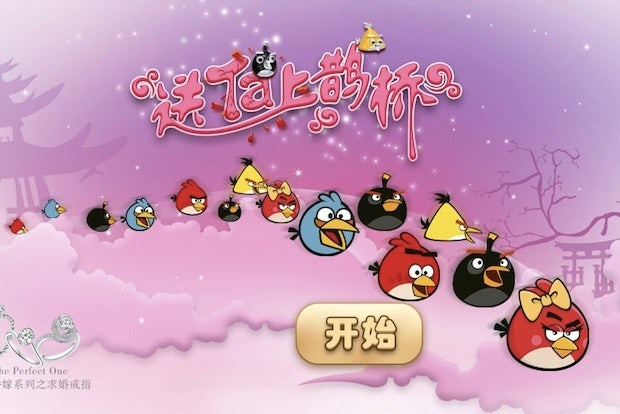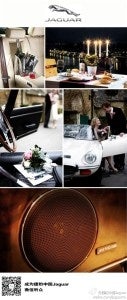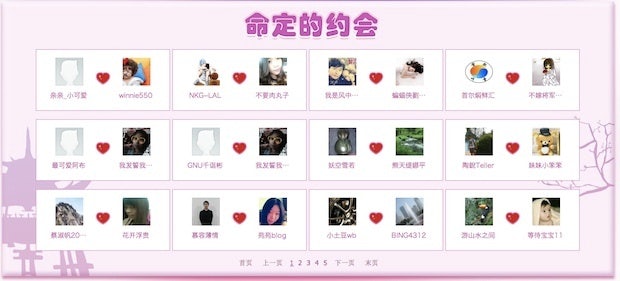
An image from Chow Tai Fook's Qixi Festival campaign, where the Angry Birds form the traditional "bridge of magpies" from Chinese mythology. (Chow Tai Fook)
Significant others across China have been scrambling to scoop up flowers, candy, and other gifts to give to their sweethearts for the Qixi Festival tomorrow, otherwise known as “Chinese Valentine’s Day”, and marketing campaigns centered around the holiday reflect the ongoing debate about whether it is losing too many of its “Chinese” characteristics.

Jaguar's marketing campaign, which teaches nervous boyfriends how to propose. (Jaguar/Sina Weibo)
Companies are making sure to remind consumers at every chance that they best not forget to make a romantic gesture on August 13. “Have you planned anything romantic with her yet?” automaker Jaguar queries its followers on microblogging platform Sina Weibo for its Qixi marketing campaign. If that blunt question doesn’t sound high-pressure enough, the brand then goes on to note that “Jaguar” sounds like “marry me” in Chinese, or jia gei wo (嫁给我), and provides advice on how men can use their own Jaguar to facilitate a special night to pop the question. Users who respond with their own schemes are entered to win a free dinner.
When composing their campaigns, marketers like Jaguar are unwittingly taking sides in a debate raging in China right now about the question of whether or not this holiday is becoming too “Westernized” and losing its sense of Chinese tradition. Jaguar is one of many companies opting to focus more on the “romantic” aspects of the day as opposed to its Chinese traditions.
Qixi (七夕) takes place annually on the seventh night of the seventh moon of the Chinese lunar calendar, a date when, according to mythology, two lovers separated by a river in heaven are allowed to reunite for one night out of the year. The holiday is sometimes called the “magpie festival”, because, according to the legend, the lovers are able to reunite when all of the world’s magpies show their sympathy by coming together to form a bridge across the river.

Godiva uses typical Western Valentine's Day-type marketing imagery for Qixi. (Godiva)
Now heavily commercialized, many marketers treat the day like a second Valentine’s Day, a Western holiday that has also been successfully adopted in China. Many Western brands offer gift recommendations for anxiety-ridden husbands and boyfriends: Godiva utilizes typical Valentine’s Day imagery such as hearts and cupid arrows to package and market its chocolates, YSL is advertising its perfumes as “elixirs of love”, Coach has been advertising its jewelry, and Gucci recommends its red luggage, because as the company says in its Qixi Festival ad, there are “two main urges in life”: love and travel.
Many critics, however, are not happy with the fact that the day is losing its sense of Chinese tradition. At a recent forum in Guangzhou featuring Chinese culture experts, the head of China’s cultural heritage protection committee, Wu Bing, said that the traditional elements of Qixi are becoming severely disparaged as young people ignore its Chinese roots. He argued that they are using the “excuse of keeping up with the times” to “tamper” with the traditional story of the lovers and the magpie bridge, “turning Qixi into Chinese Valentine’s Day.” Another expert said that the original intent of Qixi had nothing to do with love in the first place, but was rather focused on “friendship, mutual happiness, and prayer for good fortune.” These arguments reflect an ongoing debate in China over the benefits and drawbacks of trying to be more “Western” versus Chinese, and “modern” versus “traditional.”
Many marketers have indeed used elements from the traditional Chinese mythology in their marketing. Hong Kong jewelry company Chow Tai Fook, for example, creatively melded modern and traditional concepts in its advertising campaign for Weibo fans to “send their friends over the bridge of magpies.” The “magpies” in this case are the characters from the wildly popular smartphone game Angry Birds, and the mini-site for the campaign features a “bridge” of the Angry Birds. Users are encouraged to fix up two of their single friends in a Weibo message using the friends’ handles, and the “matches” appear on the Chow Tai Fook website, with a counter at the bottom to denote when the matches reach an auspicious number made up of all 7s. Participants are entered in a drawing to win—what else?—a gold Angry Birds necklace.

Chow Tai Fook's mini-site displays the "matches" that users create for their single friends on Sina Weibo. (Chow Tai Fook)
Meanwhile, Yoox is offering 23 percent off purchases for Qixi, which is advertised in a graphic featuring magpies. This campaign, like Chow Tai Fook’s, takes auspicious numbers into account, as 23 percent is the inverse of 77.
The future of the way in which this holiday is celebrated will likely be determined by a combination of the changing tastes of Chinese young people as well as the influence of companies—the February 14 Valentine’s Day has been more than successfully commercialized in both China and the West, for example. Some companies, such as Diesel, have rejected tradition altogether: the youth-focused brand's campaign instructed its fans to ignore the traditional saying that "public displays of affection lead to breakups," and "show their fearless love." For now, however, those who aren’t in China can be thankful that there’s only one holiday on which they need to stress over impressing their significant other.
Claudia Lin contributed to this article.